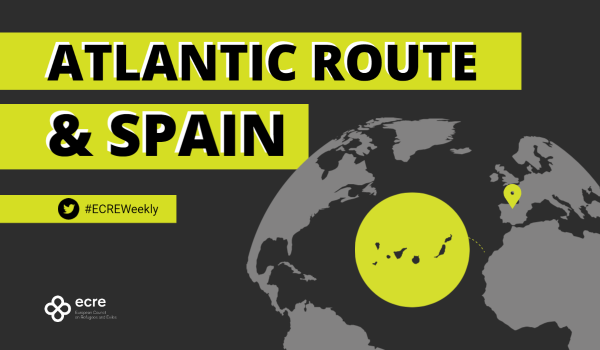At least eight people including a child have died in new tragedy on the dangerous Atlantic route. Spain continues to expand migration cooperation with Morocco at high level visit. Number of asylum applications in 2022 significantly up from 2021 but close to pre-pandemic level.
On 8 February the NGO hotline, Alarm Phone reported of three boats carrying more than 150 people in distress in the Atlantic sea. Reportedly after departing Tan-tan and Dakhla in Morocco. While Spanish rescuers managed to recover 163 people, reportedly one person had already died before landing in Lanzarote and another at least seven including a child are reported dead as the likely result of the cold on the boat covered in ten centimeters of water. On 9 February, Alarm Phone reported of that: “boat with 46 people on board that had left from TanTan on Monday morning is still missing. The boat had left together with the one rescued to Lanzarote where 8 people had died. We fear the worst and call for urgent search and rescue!”. Despite, a reported decrease of arrivals in January, the tragedy follows an increase and consistent reports of distress and rescues on sea routes to Spain in early February including on 2 February, 5 February, several on 6 February and several on 7 February. According to Helena Maleno, journalist and human rights defender with Caminando Fronteras, the organisation has counted 11,522 people who died or went missing since 2018 on routes to Spain – the large majority at sea. The Mediterranean and the Atlantic routes “are large graves that swallow more than 80% of the corpses”. The Association for Human Rights of Andalusia (APDHA) recently published a report on deaths on the Spanish southern borders including the victims of the Melilla massacre. While the Canary route accounts for 1,330 of the 1,901 deaths in 2022 the organisation regrets that a decrease of arrivals to the Spanish enclaves has not translated into less fatalities. According to APDHA: “Morocco will hardly be able to apply another approach to migrants other than violence and violation of rights”.
Meanwhile, Spanish Prime Minister Pedro Sánchez visited in Rabat in early February reportedly to reset a “strategic partnership” jeopardized in a diplomatic confrontation over the disputed Western Sahara territory. Spain caved in to Moroccan pressure when thousands of people were allowed to cross irregularly into the Spanish enclave of Ceuta in May 2021. After resuming cooperation irregular arrivals from Morocco were down by a quarter in 2022 compared to the previous year. Migration cooperation between the two neighboring countries – that has seen severe local and international critique and a push for a thorough investigation after the deadly Melilla massacre in June – was on the agenda during the visit. Spain’s Interior Minister, Fernando Grande-Marlaska continues to push for an increase of deportations of irregular arrivals back to Morocco. Meanwhile, Moroccan authorities have continued the ongoing crack-down on migrants including survivors of the Melilla tragedy and just hours before the high-level meeting another tragedy was reported. According to AMHD Nador a deportation bus carrying 55 sub-Saharan migrants arrested in Laayoune overturned killing at least four people and seriously injuring others. The NGO hotline, Alarm Phone stated on 1 february: “The Moroccan-Spanish summit begins today in Rabat, where one of the main issues to be discussed is migration. The Spanish government, backed by the EU, wants to pick up the pace before the pandemic of deportations and pull-backs”. The organisation further notes: “In our experience along the different routes to Europe, we have seen that such strategies bring more vulnerability of people on the move, abuse and more deaths”. 6 February marked a “global day of Struggle against the regime of death at our borders” with organisations campaigning under the banner of CommemorAction. European Center for Constitutional and Human Rights (ECCHR), stated: “Victims without justice, graves without names, borders without rights! CommemorAction in Berlin & globally today to remember 9 years ago when Spanish Guardia Civil fired at swimmers at El Tarajal beach, Ceuta. 15 killed. Dozens missing. Still no justice!”.
According to ECRE member, Accem a total of 118,842 applications for international protection were lodged in Spain in 2022. While the number represents a significant increase of 81 per cent from 2021, it is only slightly higher than the data for 2019, before the pandemic, when 118,446 applications were submitted. Of the 91,266 decisions made 16 per cent of the applicants were granted protection, another 23 per cent were granted residence and work permits for humanitarian reasons and 57 per cent were rejected.
For further information:
- ECRE, Atlantic Route and Spain: EU’s Strategic Partner Toughens Prison Sentences of 13 Migrants, Border & Migration Policies Blamed for Loss of Lives on Migratory Routes, Vulnerable Migrants Exposed to “Levels of Exploitation Close to Slavery” in Canary Islands, January 2023
- ECRE, Spain: Government Sticks to Script on Melilla Massacre in Face of Mounting Evidence Disputing it – MPs Call for Marlaska to Resign, Spain and Morocco Continue Strengthening Relations, December 2022
This article appeared in the ECRE Weekly Bulletin. You can subscribe to the Weekly Bulletin here.

